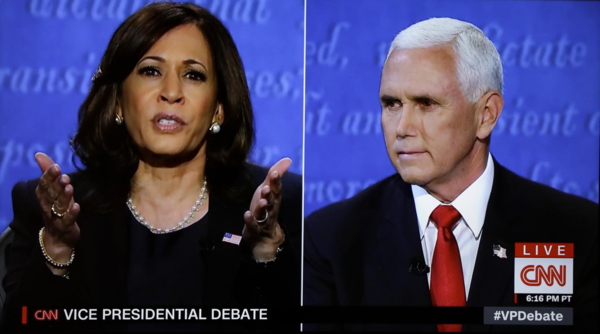The presidential debates historically have been an important part of the US elections, as voters anticipate to hear the candidates’ platforms and plans for the country. However, the first presidential debate between Trump and Biden frustrated many voters due to its lack of substance. Meanwhile, the vice presidential debate has gained more attention as the candidates had less exchange of insults and more meaningful discussions. In this Spotlight, we explore and analyze the main takeaways of the debates.
What flooded the social media after the 2020 US vice presidential debate on October 7 was not anything about the candidates: it was about a fly. A fly that made the Biden campaign create a fly swatter merchandise. A fly that sat on Vice President Mike Pence’s head for two minutes — capturing how calm and disciplined the debate was. With rarely any interruptions, name-calling, or cross-talks like the first presidential debate, this debate between Pence and Senator Kamala Harris was conducted in a more controlled manner, with moderator Susan Page keeping close track of the time limit. Unfortunately for the voters, however, more civil did not necessarily equal more truthful.

As anyone could have guessed, the first and main topic of the debate revolved around the coronavirus pandemic that has so far claimed the lives of more than 210,000 Americans. When Harris criticized Trump’s response to COVID-19 as the “greatest failure of any presidential election”, Pence argued that the administration’s immediate response to the virus in January — suspending all travel from China — saved hundreds and thousands of lives. This statement is not only exaggerated and misleading, in that the travel suspension was a partial one and that it is hard to estimate the exact impact of the response, but it also neglects Trump’s missteps in effectively responding to the spikes in COVID cases. Pence purposely avoided acknowledging what Trump has failed to do; instead, he boasted about how effective they were in preventing more disastrous outcomes.
Harris’s main strategy was to frame Trump’s presidency as a failed, incompetent administration in protecting the lives of Americans. Harris scoffed at Pence’s boastings, emphasizing that “whatever the Vice President is claiming the administration has done, clearly it has not worked”. Harris repeatedly redirected the conversation back to Trump’s failed response to the pandemic, whether the given question be about healthcare or the economy. When Harris was asked what Biden would have done differently, she responded that Biden has a plan about “national strategy for contact tracing, for testing, for administration of the vaccine”. However, Pence complained that this is exactly what the Trump administration has been doing. As he says, “[their plan] looks a little bit like plagiarism, which is something Joe Biden knows little bit about.”
On the other hand, Pence pivoted his argument around the economy. When he encountered questions he found unsettling, such as climate change, Pence steered the discussion back to taxes. He applauded the Trump administration for creating millions of new jobs, and emphasized that their initiative of decreasing taxes and regulations has greatly boosted the economy. He framed Biden’s platform as a disruption to the economy that will only impose tax burdens on the people, appealing to the current economic slowdown amid the pandemic. However, this was often done in a misleading way. For example, he criticized the Biden agenda for wanting to increase taxes with the Green New Deal — a stance that Harris has embraced but Biden has not, at least not yet explicitly. Harris refuted the criticism, clarifying that Biden’s agenda will not raise taxes for those with an income below 400,000 USD and argued that Trump’s trade war with China has actually led to the loss of about 300,000 manufacturing jobs, causing a manufacturing recession. However, while it is true that the trade war reduced economic output, the manufacturing industry is not in a recession. She claimed that “on Day One, Joe Biden will repeal [Trump’s] tax bill.” However, to make that possible, the House and Senate will have to pass that new tax legislation, which will definitely take more than a day to accomplish.
Pence and Harris clashed on many other issues, such as healthcare and the justice system. Although they were somewhat more informative about each party agenda than the presidential candidates had been, both sides refrained from answering uncomfortable questions — instead sticking to territories in which to attack the other. Historically, the vice presidential debate has been largely out of the media spotlight. However, this year, the chaotic and unproductive first presidential debate as well as the cancellation of the second presidential debate propelled the vice presidential debate into the fresh attention of voters who want an alternative to gain insight into the elections. While this debate was more civil and informative, it was quite not full of truths. Nor did it have any unexpected discussions or results — except for the fly.

